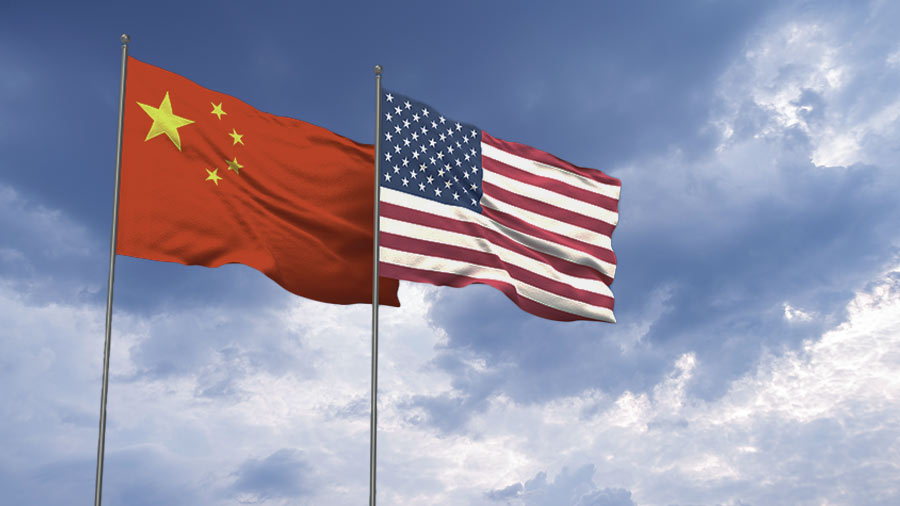trending
neon
Cirque du Soleil offers summer ticket deals
dining out
Celebs ditch the Strip for iconic Henderson restaurant
july 
trending
neon
Cirque du Soleil offers summer ticket deals
dining out
Celebs ditch the Strip for iconic Henderson restaurant
july 

The US investment ban on China is now in effect, marking a significant shift in economic relations between the two nations. Here's what it means for investors and businesses




The United States’ investment ban on China has officially come into effect, marking a significant shift in the economic relationship between the two countries. The move, which restricts American investors from funding certain Chinese companies, especially those involved in sectors like technology and defense, has profound implications for both global financial markets and U.S.-China relations. But what does this mean for businesses, investors, and the broader geopolitical landscape?
The investment ban was first proposed in response to growing concerns over national security, intellectual property theft, and the technological and military advancements being made by China. The U.S. government expressed fears that American investments in Chinese companies, particularly in high-tech industries such as artificial intelligence, telecommunications, and semiconductors, could indirectly fund China’s military capabilities and surveillance infrastructure.
In addition to national security concerns, the U.S. has also raised alarm over human rights abuses, particularly in regions like Xinjiang, where allegations of forced labor and surveillance of ethnic minorities have intensified. With these concerns in mind, the U.S. administration, led by President Biden, decided to enforce a ban that prohibits U.S. investors from purchasing securities tied to specific Chinese firms with links to these controversial areas.
The move is part of a broader strategy aimed at countering China’s growing global influence and technological advancements. By restricting investment in China, the U.S. hopes to curb the flow of capital into industries that could potentially be used to enhance China’s economic and military power.
For U.S. investors, the immediate effect of the investment ban is the forced divestment from certain Chinese stocks and the cessation of new investments in specific Chinese companies. This includes companies listed on major stock exchanges such as the New York Stock Exchange and NASDAQ, but also extends to private equity and venture capital investments in Chinese firms.
Institutional investors, such as pension funds, mutual funds, and exchange-traded funds (ETFs), have had to adjust their portfolios, either by liquidating Chinese holdings or restructuring their investment strategies to exclude these companies. The ban also affects individual investors who previously bought shares in Chinese firms through U.S. financial markets.
The impact has been felt across various sectors, with high-profile Chinese technology companies like Alibaba, Tencent, and Huawei being caught up in the restrictions. These firms, which had been the recipients of significant American capital in the past, are now facing challenges in attracting further investment from U.S.-based sources.
While the immediate impact on U.S. investors is clear, the investment ban is also expected to have broader economic consequences, both in the U.S. and in China.
For the U.S., the ban may lead to reduced access to Chinese market opportunities. China remains one of the largest economies in the world, and many U.S. companies rely on Chinese consumers for revenue, particularly in sectors like technology, automotive, and consumer goods. Companies that have significant exposure to the Chinese market may face more difficulty in doing business, and may need to rethink their strategies to navigate this new economic reality.
Additionally, the ban could lead to a reduction in the number of Chinese firms seeking U.S. listings, potentially diminishing the attractiveness of U.S. stock markets to foreign companies. Historically, U.S. financial markets have been a key destination for global companies seeking access to capital. However, as Chinese companies face increased scrutiny and potential exclusion from U.S. exchanges, this could shift the dynamic and encourage them to seek funding through other channels, such as Hong Kong or European markets.
For China, the ban represents a significant challenge. Chinese companies that are reliant on foreign investment, particularly from the U.S., will likely feel the effects of reduced access to capital. The Chinese government has already expressed concerns over the long-term effects of these restrictions, which could hamper the ability of Chinese firms to expand globally and compete with their international counterparts. In response, China may increase efforts to attract investments from non-U.S. sources, such as European or Middle Eastern investors, or even create alternative financing mechanisms that bypass U.S. influence.
The ban could also accelerate China’s drive for technological self-sufficiency. As the U.S. tightens its grip on investments in Chinese firms, China is likely to increase its focus on developing domestic alternatives in areas like semiconductor manufacturing, artificial intelligence, and other emerging technologies. This shift could make China even more competitive in the global tech landscape, but may also create friction as both countries seek to dominate critical technologies.
The U.S. investment ban on China is also expected to have far-reaching geopolitical and diplomatic implications. The move is another escalation in the ongoing U.S.-China trade war, which has already seen tariffs, export restrictions, and diplomatic tensions rise in recent years. The ban signals the growing divide between the two countries, not just in terms of trade, but in their broader ideological and strategic competition.
The ban has already been met with strong condemnation from China, which views the move as an unfair attempt to stifle its economic growth and limit its global influence. Chinese officials have warned that the U.S. risks isolating itself from the global economy and alienating potential allies if it continues to impose these types of restrictions. As China expands its own global economic initiatives, such as the Belt and Road Initiative, it may seek to build deeper economic ties with countries that are less reliant on U.S. investment, potentially creating alternative trade and investment networks.
In turn, the U.S. could face increasing diplomatic pressure from its allies, particularly those in Europe and Asia, who may have concerns about the broader ramifications of the investment ban. While many countries share the U.S. concerns over China’s growing influence, they may not be fully aligned with its aggressive stance. Countries that have significant economic ties with China, such as Germany, Japan, and South Korea, may find themselves caught in the middle of this dispute, potentially facing tough choices about how to balance their economic interests with their political alliances.
As the investment ban takes effect, there are several potential pathways for its future development. One possibility is that the U.S. may expand the scope of the ban to include additional Chinese companies or industries, particularly those that are perceived as being involved in sensitive sectors like cybersecurity, biotechnology, or advanced manufacturing. There is also the possibility that the Biden administration may introduce further sanctions or trade restrictions targeting specific Chinese industries or government entities.
Alternatively, there could be efforts to de-escalate tensions, particularly if both countries recognize the mutual economic benefits of collaboration in certain areas. In this scenario, diplomatic talks could lead to adjustments in the investment ban, or even its eventual reversal, depending on shifts in U.S.-China relations and broader global dynamics.
For now, the U.S. investment ban on China remains in effect, and its impact is likely to be felt for years to come. The move represents a critical juncture in the ongoing U.S.-China rivalry, reshaping the future of global trade, finance, and technology. As both countries adjust to this new reality, the world will be watching closely to see how this conflict unfolds and how it will shape the future of international investment and economic power
The US investment ban on China is now in effect, marking a significant shift in economic relations between the two nations. Here's what it means for investors and businesses
the latest

The Role of U.S. Technology in Global Economic Recovery Post-COVID
As the world recovers from the economic impact of COVID-19, U.S. technology companies are leading the way in digital transformation, AI-driven growth, and supply chain resilience. From cloud computing to biotech, innovations are shaping a stronger global economy

Big Tech Faces New Tax Proposals as Congress Pushes for Greater Contributions
Congress is pushing for new tax proposals aimed at Big Tech companies, seeking increased contributions to federal revenue. Lawmakers argue that major tech firms benefit from U.S. infrastructure but pay disproportionately low taxes. The proposed reforms could reshape corporate tax obligations in the digital economy

U.S. Invests in Cybersecurity Innovation to Strengthen National Security
The U.S. government is ramping up investments in cybersecurity innovation to protect national security. With rising cyber threats from foreign entities, the administration is allocating billions to strengthen defense systems, AI-driven security, and critical infrastructure protection.

Venture Capital Investments in Tech Reach Record Highs in 2025
Venture capital investments in the tech industry have reached record highs in 2025, driven by innovations in AI, blockchain, and green technology. Investors are pouring billions into startups, signaling confidence in the sector’s future growth

U.S. Tech Sector Faces Antitrust Scrutiny Amid Regulatory Crackdown
The U.S. tech sector is under heightened scrutiny as regulators and lawmakers ramp up antitrust investigations. Major tech companies face legal and regulatory challenges over market dominance, data privacy, and fair competition

Biden Administration's Funding Boosts Green Tech Startups
The Biden administration has announced significant funding initiatives to support green tech startups, aiming to accelerate the development and adoption of clean energy technologies.

Tech Industry Thrives Amid U.S. Regulatory Changes
The tech industry is seeing significant growth as the U.S. government introduces new regulatory changes aimed at fostering innovation while ensuring ethical practices. This shift is expected to create new opportunities and challenges for tech companies in 2025

Chinese AI App Sparks US National Security Concerns
A new powerful AI app developed in China is causing concerns in Washington due to its potential impact on national security, data privacy, and economic competition. US officials are closely monitoring its development

Stargate AI Project: Tech Giants Launch $500bn Investment
Major tech giants have unveiled the Stargate AI project, a groundbreaking initiative that could be worth up to $500 billion. The ambitious plan aims to reshape the future of AI